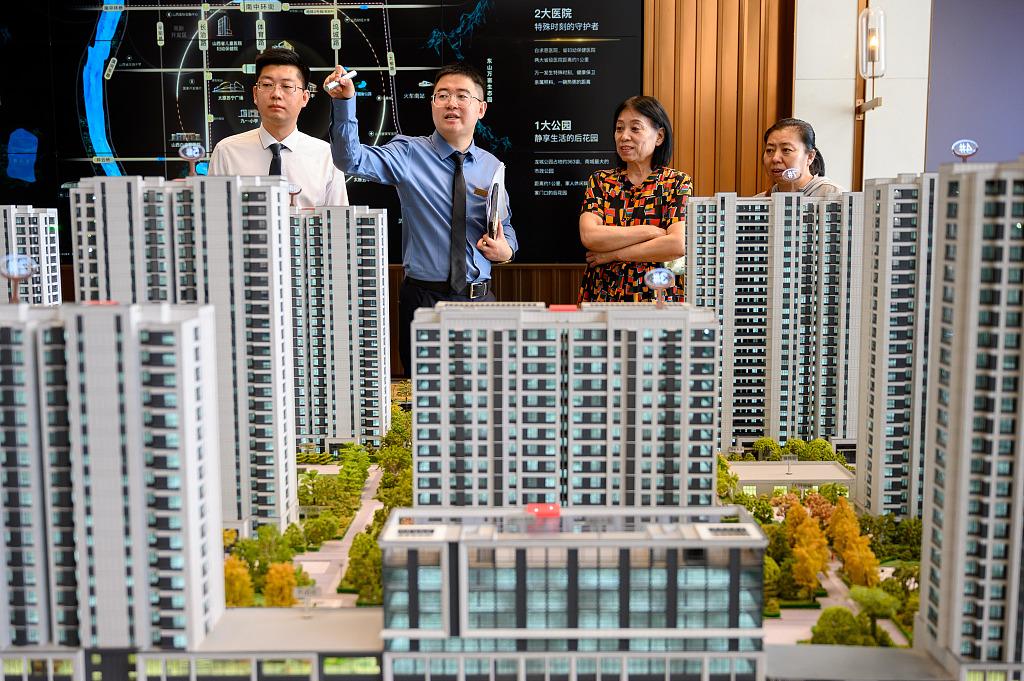Easing steps to offset slump in real estate
 0 Comment(s)
0 Comment(s) Print
Print E-mail chinadaily.com.cn, September 1, 2023
E-mail chinadaily.com.cn, September 1, 2023

Potential homebuyers look at a property model in Taiyuan, Shanxi province. [Photo/VCG]
A raft of recently announced property easing measures will help offset the headwinds stemming from a real estate slump, and China's incoming stimulus measures will support improvement in key economic indicators in the third and fourth quarters, according to experts.
They also warned of challenges from lackluster demand at both home and abroad, ongoing stress in the property sector and weakening confidence, suggesting that policymakers should adopt more measures to revive the economy. These could include fiscal transfers to households and private businesses, a further reduction in the reserve requirement ratio as well as policy rate cuts for the rest of the year, and more property easing measures in first-tier and second-tier cities, they added.
Data from the National Bureau of Statistics showed that the official purchasing managers' index for China's manufacturing sector edged up to 49.7 in August from 49.3 in July. August's reading was slightly better than the 49.4 forecast in a Reuters poll, but still below the 50-point mark that separates contraction from growth.
China's manufacturing PMI reading improved for a third straight month in August on a rebound in both production and supply. The subindex for production came in at 51.9 in August, compared with 50.2 in July, while the gauge for new orders stood at 50.2 versus 49.5 in July, the NBS said.
Zhao Qinghe, a senior NBS statistician, said manufacturers expressed more robust optimism and confidence with the help of a recently announced series of supportive government measures, with the gauge for manufacturers' expectations for their production and operation increasing to 55.6 in August from 55.1 in July.
Zhou Maohua, an analyst at China Everbright Bank, said the latest data indicates month-on-month improvement in factory activity and points to a steady recovery in China's economic activity.
"Given the gradual recovery in demand and continued economic recovery trend, China's manufacturing PMI readings will likely continue to improve in the following months," Zhou said.
However, he noted that China's manufacturing PMI reading stayed in contraction territory for the fifth consecutive month amid still-weak global demand, and some enterprises still face operating difficulties.
When it comes to the nonmanufacturing sector, Zhou said activity expanded at a slower pace in August, mainly due to a slowdown in the services sector.
China's nonmanufacturing PMI came in at 51 in August, down from 51.5 a month earlier. The services PMI fell to 50.5 from 51.5 in July, while the construction PMI jumped from 51.2 in July to 53.8 in August, according to the NBS.
"The slowdown in the services sector is mainly due to fluctuations in certain industries and financial markets," Zhou said. "Meanwhile, August construction activity expanded at a faster pace, pointing to an accelerated recovery in economic activity in key infrastructure projects and the work of ensuring timely deliveries of pre-sold homes."
China announced on Thursday higher additional deductions for individual income tax for those who are raising children or supporting the elderly, as part of the country's ongoing efforts to reduce taxes, ease household burdens and spur consumption.
Citing China's stepped-up countercyclical adjustment measures in recent months, like policy rate cuts, speeding up the issuance and use of local government special bonds and easing homebuying policies, Zhou said he believed the Chinese economy is on track for a steady recovery in the second half, with stronger policy support amid a recovery in consumer sentiment and market confidence. He added that the focus should be on spurring consumption as well as stabilizing the property sector and exports.
Louise Loo, lead economist at Oxford Economics, said: "We maintain our growth forecast (for China) for 2023 at 5.1 percent. This incorporates modest sequential improvements in the third and fourth quarters after the second quarter's sluggish outturn."






Go to Forum >>0 Comment(s)